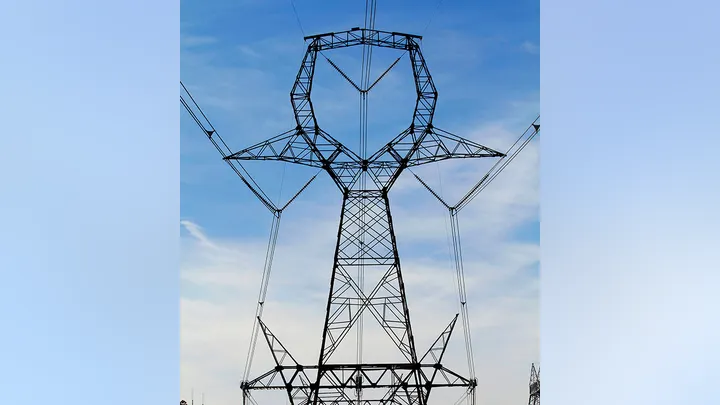A Kansas energy provider paused plans to transition away from coal power and will try to raise its rates to meet the energy demands of a new, $4 billion electric vehicle (EV) battery manufacturing factory.
“Evergy is doubling down on costly, dirty coal and asking Kansans to foot the bill,” Ty Gorman, a campaign representative for the Sierra Club Beyond Coal Campaign, wrote in April. “Evergy’s business decisions have squandered tens of millions of dollars on coal, causing an estimated 18 premature deaths annually and disproportionately harming Black and LatinX communities.”
Last year, Panasonic Energy broke ground on a 4 million-square-foot EV project in De Soto, Kansas, one of the largest facilities of its kind in the U.S. To meet energy demands, Evergy, the utility company serving the factory, will continue burning coal at part of its nearby Lawrence Energy Center until at least 2028, delaying plans to transition to natural gas by the end of the year.
Additionally, to help pay for the infrastructure required to meet Panasonic’s anticipated electricity demand, Evergy plans to ask the Kansas Corporation Commission (KCC) for a rate increase on residential customers’ energy bills in parts of the state, according to The Kansas City Star.
Before these moves drew criticism from environmental advocates and Kansas officials, the project was touted as a huge win for the state.
“This project will be transformative for our state’s economy, providing in total 8,000 high-quality jobs that will help more Kansans create better lives for themselves and their children,” Kansas Gov. Laura Kelly said when the project was announced in July 2022. “Winning this project shows that Kansas has what it takes to compete on a global scale — and that our pro-business climate is driving the technological innovation needed to achieve a more prosperous and sustainable future.”
The EV factory will require between 200 and 250 megawatts of electricity to operate, around the amount needed to power a small city, The Kansas City Star reported.
Evergy said the plant creates “near-term challenges from a resource adequacy perspective” in its testimony to the KCC. The energy demand will require the utility company to build two new substations and upgrade three existing substations, according to The Kansas City Star.
“Beyond the sheer magnitude of load and load factor, Panasonic’s construction schedule, and, in turn, its energy needs, are being planned on a very aggressive schedule,” Kayla Messamore, Evergy’s vice president of strategy and long term planning, testified to the KCC. “With energy needs starting to ramp in 2024 and full load requirements by 2026, there is urgency to procure capacity and energy to fulfill the expected energy usage schedule.”
Last week, KCC and Evergy reached a settlement agreement over a rate increase requests filed by the company in April to recover investments made to the electic grid and its customer service systems. The Commission said the Panasonic project’s expenditures remain too uncertain to determine if rate increases will be approved in the future.
“Given that the investment is still an estimate and given the magnitude of the estimated load additions, it is not evident to Staff that the addition of Panasonic is actually going to necessitate an increase in rates,” commission official Andria Jackson wrote in a press release.
American Coal Council CEO Emily Arthun said that despite the influx of green energy initiatives, there’s a growing recognition that U.S. energy still relies on coal.
“I met with senators and representatives who understand that we’re going to need coal for far longer than people are talking about,” Arthun told the Cowboy State Daily. “People are starting to understand that energy needs are increasing, and these premature [coal-fired power plant] closures are a liability.”
In a statement to Fox News, a Panasonic spokesperson said the company “defers to Evergy on its business and management of its diverse grid assets in the region.”
“While almost half of the energy in the region comes from zero-emission wind, solar, and nuclear power, we recognize that other resources are required in the near term to enable rapid growth,” the statement continued. “Building the next generation of electric vehicles and other clean technologies will require increased power generation. Over time, inefficient coal plants will be retired and more zero-carbon energy will be built to meet this demand.”
Panasonic will invest $4 billion into the project, but the Japanese company could receive as much as $8 billion in incentives from local, state and federal governments, according to Good Jobs First.
The Japanese company could be eligible to receive as much as $6.8 billion from the Inflation Reduction Act’s 45X Advanced Manufacturing Tax Credit, aimed at increasing production of electric vehicles.
“I’m just concerned. This whole green energy program, the only way it stands on its own two feet is with all these government subsidies,” said Kansas Sen. Roger Marshall. The Republican said that while he wants the project to succeed, “I am concerned about the amount of money they’re being subsidized on the backs of hardworking Kansans.”

